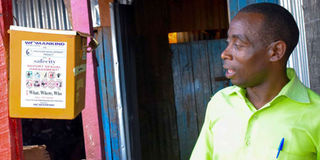The ‘talking boxes’ empowering Kibra schoolgirls

Deep inside the sprawling Kibra slums in the heart of Nairobi city, is an untold tale of the ‘talking boxes’ that are changing the lives of young girls.
The tale is a unique idea empowering destitute young girls in local schools. Locals are conversant with this the unique story of how young girls are being assisted to cope with challenges of surviving in a slum.
Polycom Development Project, a non-governmental organization that works towards empowering slum girls and women are the brainchild of the ‘talking boxes’ idea.
Polycom Programmes Officer Beatrice Ottawa, says they came up with the concept of talking boxes in schools in 2010, after realising young girls lacked safe spaces where they could express themselves whenever they faced a problem.
Ms Ottawa says many girls would go to school crying, but could not utter a word on the problem they faced. She adds that despite prodding them, nothing came out from almost all of them.
“When probed on what the problem was, many would just shake their heads. We would then leave the schools with many questions. How best can we help them talk? What could their problembe?”says Ottawa.
She adds that it is at this point they realised there was a disconnect between the female pupils, teachers and their parents – the girls tended to keep to themselves on issues affecting them.
The programs officer says they discovered that girls had difficulties opening up to their teachers and mothers on issues touching on body changes, menses, sexual harassment and need for sanitary towels, among others.
“We came up with the idea of installing safe spaces in the form of talking boxes in schools, for the girls to express themselves freely,” says Ms Ottawa.
WORKED WONDERS
As a result talking boxes were installed in 50 school across the slum. They worked wonders as the girls soon started pouring out their hearts on issues affecting them.
Girls with disturbing issues are asked to write a note detailing the problem, and the kind of help they may need before putting it in the boxes.
It is the pupils who dictate where the boxes are installed. The teachers and other staff in the school do not have access to the boxes since the assumption is that some of these people may be the perpetrators.
This also ensures confidentiality of the sensitive information contained in some of the letters is maintained.
Ms Ottawa says they collect about 200 letters from all the schools every day. Need for sanitary towels, sexual harassment, sexual transmitted infections, food appeals and family domestic issues top the list of the girls’ concerns.
“After reviewing the letters, we undertake content response by looking for the girls and giving sanitary towels to those in need, and taking to hospital those who have been sexually abused. We also ensure those without food at home at least get something to eat,” she says.
SANITARY TOWELS
Apart from running the talking boxes program in Kibra, the organisation also makes emergency distribution of sanitary towels and detergents for washing toilets to schools in the slums of Mathare, Mukuru Kwa Njenga and Kiambiu, all in Nairobi.
They make their own sanitary towels and detergents, a thing that has enabled them supply schools with the much needed commodities.
Every term, says Ms Ottawa, they distribute more than 2,000 packets of sanitary towels benefitting about 2,500 girls in all the schools.
Ever since the introduction of the talking boxes concept, the organization notes that cases of teenage pregnancies and school absenteeism among girls during their menses have drastically reduced.
“The talking boxes have proved to be the best idea. Last year during KCPE, we only had one girl who was pregnant contrary to other years when we could have ten or more,” she adds.
The taking boxes concept is credited with helping in saving a life in one of the schools in the run-up to KCPE last year. A pupil who was due to sit for KCPE at St Juliet Education Centre indicated in a letter found in the box that she intended to commit suicide after learning that she was pregnant.
EMPOWERED GIRLS
Charles Musonya, a mentor at the school says they acted swiftly.
“With the help of counsellors from Polycom, we were able to counsel the girl and let her know that pregnancy is not the end of the world. She changed her mind and in fact, joined form one last month,” says Mr Musonya.
The teacher adds that the boxes have empowered the female pupils to speak up boldly.
Wilson Wasika the head teacher of Karama Academy says the boxes have restored dignity among female pupils.
“Some girls used to miss school during their menses. They would use improvised sanitary towels. The program is godsend to some of the girls,” says Wasika.
He adds that the program has helped mentor many pupils to become responsible young women and enabled them make informed decisions that have played a critical role in their academic work.
VOLLEYBALL TOURNAMENTS
To boost the positive behaviour change among the girls, the schools organise volleyball tournaments where the girls’ mothers are invited. The girls and their mothers discuss issues affecting them candidly and strive to find solutions.
Ottawa says the organization gets support from some of its donors including, United Nation Population Fund (UNFPA), Global Giving, Women Kind Worldwide, GCCAP and Wairu commission.
“Even though resources are never enough to cater for all the girls who need assistance, we strive to share the little we have to ensure each one gets some help,” she says.
One of the parents, Ann Ochieng, a mother of four whose two daughters have benefitted from the program says it has been instrumental in moulding their future.
“Through frequent counselling and mentorship, my daughters who are now in secondary school, have become responsible young women able to make informed choice,” she says.





